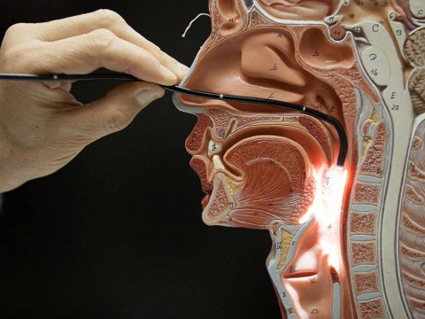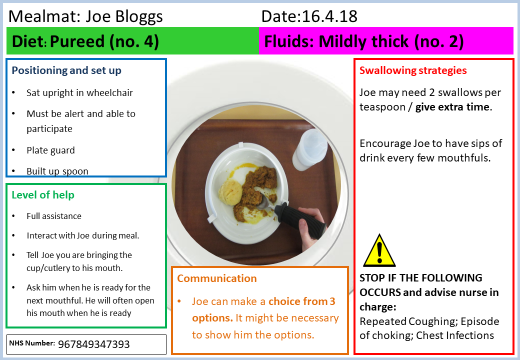Innovations in Speech and Language Therapy
How the RHN’s ‘small but mighty’ SLT team is innovating to improve the lives of patients and residents
The Royal Hospital for Neuro-disability’s (RHN) Speech and Language Therapy Team (SLT) have been described as ‘small but mighty’. Although the SLT team is smaller than many of the other Allied Health Professional (AHP) teams at the RHN, this does not stop them from making a huge difference to the people we care for here. Our SLTs assess and manage communication and swallowing difficulties which makes a huge difference to those with brain injuries and their loved ones.
The team are constantly looking for ways they can innovate to improve the lives of those at the hospital, both in terms of safety and the quality of their life.
Fibreoptic Endoscopic Evaluation of Swallowing (FEES) clinic
A big development in speech and language therapy is the fact that SLTs independently use Fibreoptic Endoscopic Evaluation of Swallowing (FEES). This is a detailed swallowing assessment using a camera called an endoscope. It enables professionals to look down the throat in order to evaluate whether food and drink can be safely consumed without choking or aspirating (going down the wrong way).

Fibreoptic Endoscopic Evaluation of Swallowing (FEES)
FEES was previously only carried out by Ear Nose and Throat (ENT) doctors, but in 2009 the RHN made sure that SLTs were able to undertake these assessments, allowing more patients to be seen in a timely way.
Mealmats
The SLTs, along with their occupational therapist (OT) colleagues also introduced mealmats at the RHN. Mealmats are laminated placemats which are produced for all patients who eat and drink. It guides staff on how to make the process as safe as possible for the patient, specifying the consistency the food needs to be, positioning whilst eating, level of help required and swallowing strategies.

An example of an RHN mealmat
Tasting foam
The RHN has become one of the first places in the UK to use flavoured foam tastes. Foam tastes allow a patient to taste the foam of any drink without needing to swallow it and can also help to assess to what extent people can respond to different tastes. It was brought to the hospital’s attention when Clinical Lead Speech and Language therapist Amy Pundole saw a rep demonstrating foam tastes on a training day.
‘I had a taste and immediately thought “oh my goodness, this is going to be amazing for our patients”. We have so many patients that are long term nil by mouth. Not being able to have anything to taste must be horrible and we know it has such a negative impact on quality of life’.
Erin Probert, Clinical Lead SLT, and the Continuing Care SLT team have completed a study on using the foam tastes with people who are nil by mouth at RHN, which they are hoping to get published. The research explores some of the risks and benefits of the foam. Of the 14 patients from the study, 9 went on to have regular flavoured foam tastes handed over to ward staff, and one man has even been down to the pub to have tastes of gin. One resident said ‘I haven’t had anything past my lips in 10 years, so it tastes wonderful!’
They also presented a free online open lecture on foam tastes this summer which was fully booked, with 500 people signing up. The SLT team gets frequent enquiries from other SLTs about the foam. ‘We’re an innovator and a trailblazer with it for many people’.
Below is an example of the flavoured foam being used at the RHN
@rhnuk Tomorrow is Swallowing Awareness Day! Our speech and language therapy team use flavoured foam to allow some of our patients to safely taste their favourite beverages🚰☕️ #SLT #braininjury ♬ original sound – RHN
The future
Looking to the future of Speech and Language Therapy at the RHN, the team have set up an Outpatient FEES clinic so that an external SLT organisation, Linguistic Resolutions, can refer their patients to the RHN for an expert swallow assessment. We are looking forward to our first referral!
The team are also in the very early stages of exploring whether Phagenyx will help our patients. This is a pharyngeal electrical simulation system which improves swallowing. It is a new technology which has started being used by similar SLT teams.
The team hope it can be used in the future with lots of our patients to help them eat and drink again, manage their saliva better and manage and possibly remove tracheostomy tubes.
The future of speech and language therapy looks bright, and the RHN SLT team is continuing to be active and creative in supporting our patients and residents to live life to the fullest possible.